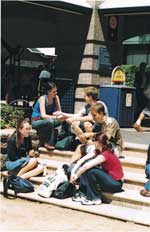Faculty Information and Assistance
|
Computing Information
Course Descriptions
Enrolment Procedures
General Education Requirements Guidelines for Maximum Workload
Rules for Progression
Cross-Institutional Studies and Exchange Programs
Professional Associates
Student Representatives
The Law Society
|
Who Can Help?
If you require advice about enrolment, degree requirements, progression within programs or information about course content and requirements, contact the School of Law Student Services Office. Please refer to the School of Law homepage for timetables and general information: www.law.unsw.edu.au
|
All students have access to a range of research tools from the computer desktops including email, www, national and international legal databases and library catalogues.
Continuing students should follow the enrolment information guidelines published at
Law website: Continuing Undergraduate Students
New Students
New students are informed of enrolment procedures at the time of offer.
Full-time Status
The majority of Law programs are full-time and require attendance at classes four days per week. Students are reminded that a full-time program is intended for students who devote the principal part of their available time to their program. Any additional commitment, in the form of paid work, training for sport at a significant level of achievement or voluntary work in community organisations, is bound to have an effect on a student's work. Past experience shows that additional commitments beyond 10–15 hours per week almost invariably have an adverse effect on student performance and in some cases have led directly to failure. Students are strongly advised that, if an outside commitment of this order is likely to be maintained consistently over a semester, the commitment should be discussed in advance with the Co-ordinator of Undergraduate Education. It should be noted, however, that it is the individual teachers who determine whether outside commitments should constitute grounds for consideration in meeting the requirements of particular courses. This determination can only be considered when an application for special consideration is made to the university.
General Education Requirements
Guidelines for Maximum Workload
Any student wishing to vary their program (law or non-law) by enrolling in a reduced program or in courses which do not conform to the normal sequence, must seek approval from the Co-ordinator of Undergraduate Education.
Undergraduate students wishing to overload must submit an 'Overload Request' form at the Student Services Office. Permission can only be given on the basis of a written application in advance of the relevant semester.
Progression in programs is generally dependent on the successful completion of prerequisites and corequisites for courses as listed in the schedules of courses for each program. Students are required to have completed 84 units of credit of core Law courses before enrolling in any elective course.
Where the academic record of a student is not of a satisfactory standard, the Co-ordinator of Undergraduate Education may recommend a restricted program. This applies to all undergraduate programs offered by the Faculty.
Cross-Institutional Studies and Exchange Programs
Courses which have been successfully completed at another law school (where they are offered as part of an LLB program either in Australia or overseas) may be credited to the student's degree up to a maximum of 48 UOC.
The School participates in several overseas exchange programs, and encourages students to take advantage of these. Information regarding these programs can be obtained from the International Exchange Office.
Students should discuss their plans for cross-institutional studies with the appropriate student advisor in order to determine both their eligibility to undertake such studies and the 'creditability' of the courses under consideration.
|
The Law Society Executives are elected annually. The body consists of a Managing Executive and various Committees led by two Co-Presidents (male and female).The responsibilities of the Law Society fall into four main portfolios:
- Academic: This includes Publications (First Year Survival Guide, Innominate, Law Annual, Alternative Law Careers Guide, Poetic Justice); Competitions (Mooting, Client Counselling, Witness Examination and Negotiations); Policy Development (Curriculum Reviews and Speakers' Forum);
- Internal Activities: This includes Social Events ( e.g. Orientation Law Camp, Law Ball, Intervarsity Sporting Competitions, Intervarsity Parties, Regular Law Drinks, Trivia Quizes and informal social events); Information Technology; and Member Services;
- Careers: This portfolio strives to enhance the opportunities available to students by hosting a series of events in conjunction with International and National Legal and Non-legal firms. These include Firm and Student 'Connect' Events, Headstart Mentoring Program, Asia Law Careers Fairs and a range of Firm presentations and workshops throughout the year. A series of Careers Guides are also released annually.
- Equity and Community: This portfolio ensures that the interests of Graduate, Indigenous, International, Female and Queer students are represented. In addition, there are a range of events such as the Social Justice Advocacy Project and forums are organised. They also publish the bi-annual "Court of Conscience" a social justice focused publication.
Law Society contact details - Room 305, website: www.unswlawsoc.org
School of Law - Faculty Information and Assistance | Summary of Programs










